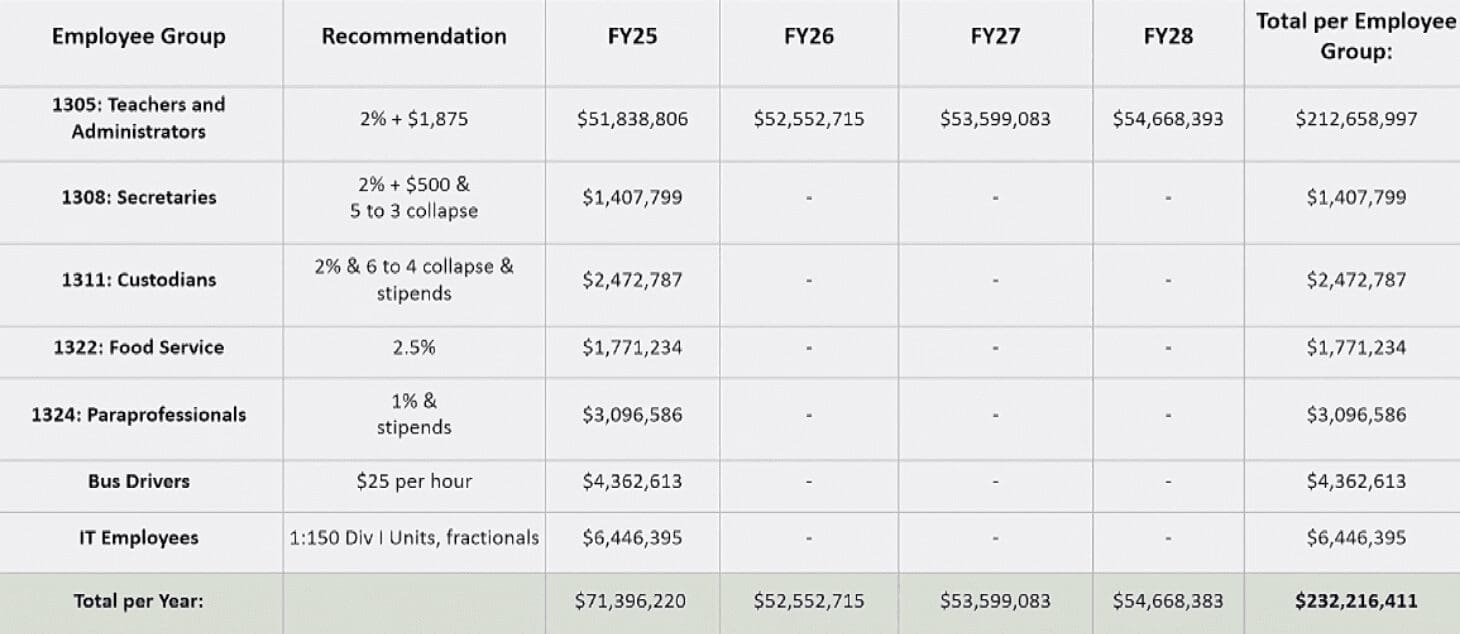

Delaware legislators Thursday were presented the recommendations from a state educator pay committee.
Delaware state senators and representatives didn’t revolt when they got their first bite at recommendations for higher educator pay that would cost the state hundreds of millions in coming years.
But questions did arise in Thursday’s joint House And Senate Education committees meeting that lasted about 1 ¼ hours.
They included concern about poorer districts’ ability to pay their 30% share of salaries, whether incentives should be created for high-performing teachers, whether the state was chasing arbitrary salary numbers from other states, and whether the state also should look at other issues – such as classroom discipline – that affect teacher morale and retention.
The salary recommendation came from the final report of the 15-person Public Education Compensation Committee, which met all year.
Secretary of Education Mark Holodick and Kim Klein, associate secretary of operations at the Department of Education, presented the final report of the Public Education Compensation Committee to the joint meeting.
“What I see here in terms of compensation looks good to me …with minimal study so far, but I like the concept of what you’re doing,” said Rep. Rich Collins, R-Millsboro.
There are other issues in education he worries about, including teacher attendance. Superintendents have told him many take off Fridays for a three-day weekend.
“We ought to consider some sort of incentive program through this,” he said.
He believes teachers don’t want to be in the classroom because of the lack of discipline for misbehaving students.
“If we look at a comprehensive package to solve our fundamental problems, I would think this would be the ideal place to try and address it to some extent,” Collins said. “In other words, give the teacher a better working environment combined with higher pay.”
He also wants the state to keep taxpayers in mind, especially because of inflation and with property reassessments taking place in New Castle and Sussex counties.
“I would think it would be reasonable to at least look at any other area we could to see where we might be able to find cuts, to try and keep the burden on the taxpayers to something that they can afford,” Collins said.
Pay committee recommendations
The pay committee evaluated the five education groups in Delaware Code, as well as two employee groups that are not listed: teachers, custodians, nurses, bus drivers, administrators, secretaries, information technology workers, paraprofessionals and food service workers.
The committee was formed to make Delaware regionally competitive with salaries to strengthen its educator pipeline and ensure the recruitment and retention of school employees.
Notable pressure came from neighboring Maryland, which passed a law that would increase the starting salaries of teachers to $60,000 by 2026.
“You’re setting up districts to be challenged to keep good teachers because they’re going to be competing against other districts that can afford it,” said Sen. Eric Buckson, R-Dover, a former teacher and coach.
He wanted to see data on how other states are raising revenue as well as cost of living.
“I need to really know what the apples to apples are, because if you don’t, you start chasing other people’s budgets and that gets dangerous,” Buckson said. It’s an opinion he’s expressed before.
IN THE NEWS: Bill banning paying disabled less takes effect this month
“I’d like to be able to know the difference between the two because maybe our cost of living is different and [Maryland’s] $60,000 is equal to our $54,000. I don’t know, but we really need to have that conversation.”
The pay adjustments involve hiking salaries by a series of annual raises and stipends.
The recommendations also would condense some salary scales to create fewer steps up the ladder of pay raises triggered by years of experience and qualifications such as a master’s degree.
Rep. Mike Smith, R-Pike Creek, and a member of the compensation committee, said there needs to be consideration about the salary structure and requirements. Some teachers simply cannot afford to go back to school and earn a master’s degree that would bump up their pay..
He also pointed out how important staff retention is.
“What we’re seeing, what’s very successful, is if you have the school leader that’s been in that school for 20 years, and grew from either a para or a teacher and worked their way up to school leader,” he said. “It’s obviously helped camaraderie with other teachers and staff and it’s also helped build credibility with parents and students within the schools.”
Here’s what the committee recommended for each employee group:
- 1305 – teachers and professional staff: a 2% increase plus a $1,875 stipend (state cost = $212,658,997 over next four fiscal years).
- 1308 – secretaries: a 2+ increase plus a $500 stipend and condensing the scale from five positions to three (state cost = $1,407,799 for fiscal year 2025).
- 1311 – custodians: a 2% increase, stipends ranging from $439 to $1,105 and condensing the scale from six to four positions (state cost = $2,472,787 for fiscal year 2025).
- 1322 – food service: a 2.5% increase (state cost = $1,771,234 for fiscal year 2025).
- 1324 – paraprofessionals: a 1% increase and stipends ranging from $1,000 to $2,000 (state cost = $3,096,586 for fiscal year 2025).
- Bus drivers: Increase hourly wages from $22.50 per hour to $25 (state cost = $4,847,348).
- IT employees: created funding units for workers (state cost = $6,926,517 for fiscal year 2025).
The rollout will be phased over four years:
Discussion in legislature
The recommendations are strictly the state share, which is about 70% of the funding. The remaining 30% of an educator’s pay is funded locally by a school district.
Since the target is $60,000, the recommendation would have the state on the hook for $42,000 of that and the local district for the remaining $18,000, which isn’t a guarantee.
“Some districts may already be there, some districts may be able to get there fairly easily,” Klein said.
“I won’t say it’s going to be easy for anyone. For the sake of this discussion, I’ll pick on Delmar a little bit. They would have the most significant challenge to get to the 30% of $60,000 as the state, but that’s a local decision, so we can’t mandate that they get to their 30% of the $60,000.”
IN THE NEWS: WilmU: $1M Longwood grant to fund 2 Brandywine buildings
Holodick said Delmar School District is struggling to compete with Wicomico County in Maryland.
The local portion is negotiated with districts and the teacher’s union.
“Delmar is not likely to be at $60,000 in fiscal year 2028 without significant local taxation to bring that local share up,” Klein said.
Rep. DeShanna Neal, D-Elsmere, said she would like to see some sort of stipend or opportunities established for bus driver training.
The shortage of bus drivers has been a burden for Delaware’s schools in recent years, and across the nation.
“The cost of training for bus drivers is another barrier for them,” Neal said, “Some want to be a bus driver but can’t afford the training.”
School safety and discipline, transparency and accountability have also been areas of attention in Delaware schools by school staff, parents and legislators.
Rep. Stell Parker Selby, D-Milton, who spent 34 years as an educator in public schools and five years in higher education, said seeing the recommendations warms her heart.
“I feel really good to know that finally we’re looking at teachers,” she said. “Without a teacher, none of us would be sitting here today reading and being able to discuss things with each other, and I think we need to start really looking at that and prioritizing it even more.”
Past actions of PECC
MAY ‘22: Teacher compensation bill aims to strengthen educator pipeline
OCTOBER ‘22: State teachers’ union asks for base pay hike
JANUARY ‘23: Carney to raise teacher salaries 9% starting in 2023-24
JANUARY ‘23: Carney’s education raises cause stir in compensation committee
FEBRUARY ‘23: Educator pay committee delays salary vote over budget, timeline
MARCH ‘23: Heated debate ends in vote to raise teacher pay over 4 years
APRIL ‘23: School pay committee sets raises for secretaries, custodians
MAY ‘23: Food service workers, paraprofessionals could get raises
AUGUST ‘23: Compensation committee: Raise bus driver pay to $25 an hour
SEPTEMBER ‘23: Suggestions for educator raises finalized by pay panel
OCTOBER ‘23: Pay panel to give Carney educator salary proposals next month
JANUARY: Educator pay raise proposals to get joint hearing Jan. 11


Raised in Doylestown, Pennsylvania, Jarek earned a B.A. in journalism and a B.A. in political science from Temple University in 2021. After running CNN’s Michael Smerconish’s YouTube channel, Jarek became a reporter for the Bucks County Herald before joining Delaware LIVE News.
Share this Post




